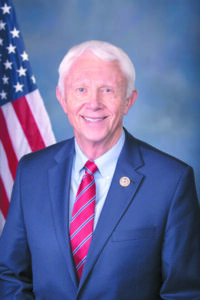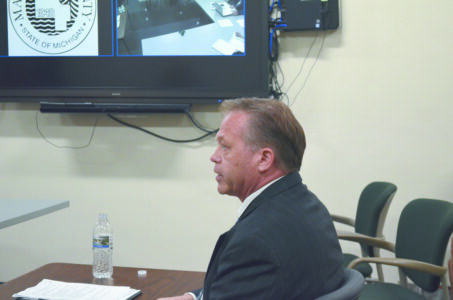State of flux
U.P. power headed to renewable sources

The photo depicts a portion of the 480 panels currently in use at the Marquette Board of Light and Power’s Community Solar Garden. The project is one of several that Peninsula Solar has installed for large commercial customers, local residents, businesses over the last two years. (Photo courtesy of Ian Olmsted)

MARQUETTE –Power in the Upper Peninsula is in a state of flux, with two coal-fired plants retiring over the last 12 months in Marquette County alone, the region is moving toward renewables.
Deb Muchmore, a moderator for the Michigan Public Service commission at the recent U.P. Energy Summit called the trend “a fast phase of transformation really toward that renewable portfolio that is so prominent in our discussions today. You can see how quickly this transformation is occurring. It presents wonderful opportunities and challenges. Certainly, Michigan is on the forefront of all this.”
Carmen Clark, Regional Manager of Customer Affairs at the Midcontinent Independent System Operator, or MISO, presented a map of new U.P. projects proposed as of April.
Of the eight proposed projects in the MISO queue, two are natural gas, two are wind, and four are solar, Clark said.
“A lot of it is solar right now,” Clark said. “Solar is the big switch. It was wind and a little bit of gas — gas is kind of at the lower end at this point.”
The queued projects range from 1.35 megawatts to 125 megawatts of proposed generation, but six of the proposed facilities are not started yet, Clark said.
MISO, a non-profit organization that monitors the transmission system in 15 U.S. states and one Canadian province, currently has about 100 gigawatts in its queue overall.
Of the 44.5 gigawatts proposed in April across the midwest, Clark said 59% was solar and 27% was wind.
“And then looking at what actually comes to realization, about 15 to 20%,” Clark said. “That is what comes to fruition in our queue. So if you take those numbers, not all of that actually comes to fruition.”
According to its website, MISO exists to provide an “independent platform for efficient regional energy markets,” fostering wholesale electric competition and creating greater system reliability.”
Daniel Scripps, a member of the Michigan Public Service Commission, said the new projects in Michigan itself, especially the 2018 Integrated Resource Plan requirement for investor owned utilities like Upper Peninsula Power Company and Upper Michigan Energy Resources Corp., represent a shift in energy policy, generation and transmission because of the more holistic approach it provides.
“I think one of the biggest changes and clearly one of the biggest positive changes of the 2016 legislation is that we moved from sort of a check-box approach and a reactive approach from the commission to something that, I think, is more proactive across the board in utility planning,” Scripps said.
MPSC Commissioner Norman Saari said he looks at the IRP as more than just a state-mandated industry guideline.
“The world of energy is changing. I know that what the early enablers were looking at in Michigan for renewable portfolios and how this advancement matured so much,” Saari said. “And how when you look at transmission systems, and how when you look at distributed generation and how when you look at demand-side management and how when you look at alternatives these are not just intellectual discussions.
“As my friend Tom Casperson would say — it’s kind of likened to the Green Bay Packers’ playbook. Part of it is offense, part of it is defense and part of it is special teams. (For energy), part of it is transmission, part of it is energy savings and part of it is the workforce of the future. The key to it is communications, the key to it is making certain that we in Lansing and we at the commission are not making these decisions in a vacuum, but that we are requiring these utilities to get engaged and get involved in this.”
MPSC chair Sally Talberg noted the shift toward renewables points to a positive trend for U.P. power needs and the economy far into the future.
“These (IRPs that include renewables) are critical to figuring out long term, what is going to be reliable, making sure there is diversity, not putting all of our eggs in one basket and having a holistic view,” Talberg said.
She acknowledged there may be short-term issues that may need to be addressed such as the closures of coal fired generation sources like the Presque Isle Power plant in Marquette, which was retired in May and provided over 100 jobs to the region.
“Last night we drove by the Presque Isle Power Plant. You know these are not insignificant issues for an economy,” Talberg said. “The gas plants do not require as many employees, and so there is an impact. It is encouraging that the workforce, the union and the economic development agencies are working together to make sure that people can transition into other sectors and maintain employment in the region as well. The facility has a big imprint on the community itself.”
Lisa Bowers can be reached at 906-228-2500, ext. 242. Her email address is lbowers@miningjournal.net.






